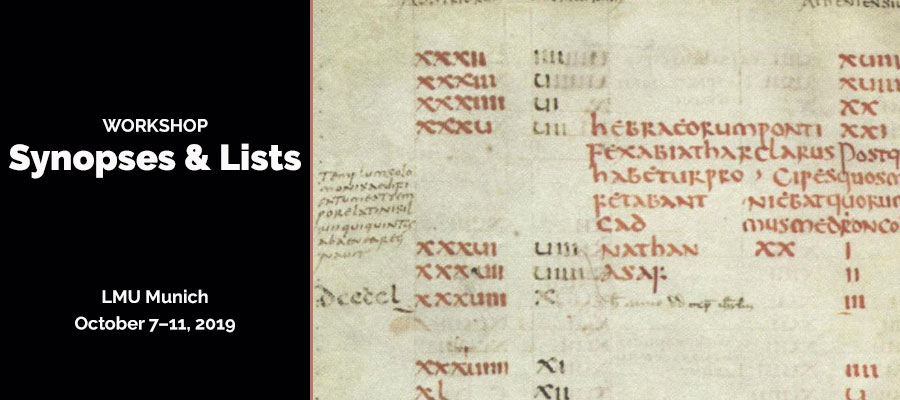Synopses and Lists Workshop, LMU Munich, October 7–11, 2019
The Center for Advanced Studies (CAS) at LMU Munich is a forum for intensive international academic exchange. Its purpose is to promote cooperation with national and international Visiting Fellows who work closely on collaborative projects with LMU professors. In order to intensify interdisciplinary cooperation at LMU Munich, the Center has set up the CAS Research Focus program.
Members of the CAS Research Focus "Textual Practices in the Pre-Modern World: Texts and Ideas between Aksum, Constantinople, and Baghdad" organize a workshop on "Synopses and Lists" at CAS LMU. The workshop will bring together internationally renowned researchers who are invited to LMU Munich to contribute to the Focus Group's research as visiting fellows for up to 4 weeks. The participation at the workshop "Synopses and Lists" (7 - 11 October 2019) is a mandatory part of the fellowships.
Textual practices in pre-modern societies cover a great range of representation, from the literary to the pictorial. Among the most intriguing are synopses and lists. While lists provide a complete enumeration of ideas, people, events, or terms, synopses juxtapose one against the other. To understand how they were planned, produced, and consumed, is to gain insight into the practices of what one can call management of knowledge in a time before out to our own. Synopses and lists entail a variety of textual practices to allow storing, retrieving, selecting, and organizing this knowledge. Both make deliberate – yet not always explicit – choices as to what is included and excluded, thereby creating lasting hierarchies and canons.
Synopses and lists are found in all kinds of textual materials, from the Eusebian canons to tax lists and genealogies in the Bible and in historiographical works. What is their role in constructing a particular vision of the world and in providing meaningful record of it? What types of synopses and lists exist, e.g. indexes, tables of contents, systems of cross-references, divisions of the text into sections and subsections made visible on the page through the layout, signs, or different scripts? Aiming to understand how synopses and lists function in different types of literature, the workshop particularly looks to offer a historical and transcultural perspective.
Applications are welcome from all disciplines dealing with these questions. Both senior and junior postdoc researchers are encouraged to apply. The Center for Advanced Studies will provide financial and organizational support for visits lasting from one to four weeks. Travel and accommodation will be paid for and an allowance will be provided to cover operating costs. Guests will receive a workspace at the Center and will have access to all its facilities.
